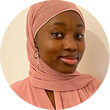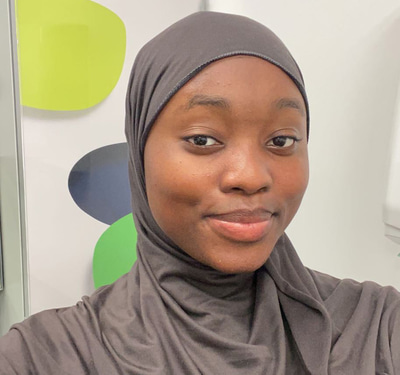- OT
- Life in practice
- Career development
- “Before Villa Vision I didn’t know that something like this could exist”
Students in...
“Before Villa Vision I didn’t know that something like this could exist”
Master’s optometry student and pre-reg, Nura Mussa, on the reasons she keeps going back to Villa Vision, and combining optometry with her passion for teaching


Nura Mussa
26 September 2022
Meet the student
University: Aston University
Year of study: Master’s student and pre-reg
Why I want to become an optometrist: I didn’t really know about optometry but then I did some work experience at a pharmacy and an optical practice, and optometry piqued my interest more. In a nutshell, I want to become an optometrist to give my patients a positive experience by providing a high standard of eye care.
One of our lecturers sent around a notification about the Aston Villa Foundation’s Villa Vision initiative. I read the brochure and there were several things that were interesting to me. Providing eye care first of all, but then I saw things like workshops and teaching.
Separate from optometry I hold a mentoring position, so teaching piqued my interest. The other key element was providing eye care for children from a lower socio economic background, like myself, and raising awareness.
I remembered that my brother had Villa Vision come into his school. I actually asked him for some advice before I went in on the day. It had been two years since his school visit and he could still remember their names. He told me how amazing the interactive activities were, and the virtual reality (VR) headsets that the foundation uses to raise awareness about colour vision deficiencies. He was very positive about his experience and that gave me a boost to go and join them. I wanted to see it for myself and also felt that I had to do things right because, if Villa Vision had this positive impact on my brother, then I also have to have a positive impact on the students.
Before Villa Vision I didn’t know that something like this could exist. I’ve now had three interactions with Villa Vision, because I keep going back. The biggest surprise for me was the variety of experiences involved. It wasn’t just the workshop and the screening, which I initially thought it would be, there was more to it and a lot more personal development for the optometry students.
I first went along to the workshop and the screening. The workshops are really interactive and well put together. We observed what they said to the students, then helped with handing out equipment, like the VR headsets, and giving instructions to small groups. We answered a few questions that the students had and spoke to them about the eye models.
Then we observed the colour vision and VA screening. I had the chance to screen children and ask them the questions that are standard in all vision screening programmes. It was helpful to build my communication skills, speaking with the children about whether they had had eye tests before, if they wear glasses, and just having conversations about eyes in general.
Then I attended a match day at Aston Villa stadium. They had lots of different activities set up for fans and their families to take part in. Villa Vision was there to raise awareness about colour vision deficiency and eye tests. We would speak to the fans, draw their attention, and engage them in the activities that were available.
The third experience I had was providing a workshop for a local Scout group. This one was a little bit different from the others, but the heart of the Villa Vision was involved in every experience.
I really liked being given roles to challenge myself and upskill
Challenged and supported to upskill
I really enjoyed my time with the programme. The interactive workshops are fun, educational and a little bit challenging for the children. One of the questions in the workshop is “why are eyes important” and it’s very difficult to gather answers, because in their view: ‘eyes are eyes – they are important and that’s it.’ But we were challenging them to think about why it's really important; linking it to football for example, and how if someone has colour vision deficiencies, then it might make it a bit difficult for them to see the colours on the pitch or see the opposition if they’re wearing colours that they can’t see.
I felt like there was always support and reassurance when we needed it, so nothing was too difficult. The team created challenges for the optometry students to improve our skills, such as leadership and personal development.
For me there has been a short-term and a long-term impact. In the short-term, I found this experience very insightful because it’s been a nice bridge from theory to practice. For example, we learn about vision screening and binocular vision in paediatrics at university but actually experiencing this in person made it more memorable. Binocular vision is tricky, but having that real life application made me see it in a different way. Revising for it became a little bit easier, because I felt like I had to do this. Seeing the impact that you can make in a child's life was really important. Then, vision screening was one of the main questions in my exams. I’m confident I aced it.
I like teaching and I thought I would have to leave that behind and focus just on optometry, but I realised that I can combine the two of them together
In the long-term, the foundation has encouraged me to think about the broader picture of practising. Optometry is just how we see it: if you see it as practising in the test room, and that’s what you want to do then that’s fine, but if you want it to merge with other aspects of your life then that is possible. I like teaching and I thought I would have to leave that behind and focus just on optometry, but I realised that I can combine the two together and I’m willing to explore this in the future. If I didn’t have Villa Vision, I probably would have closed that chapter of my life. Now I feel like I don’t have to, because there’s so many more opportunities that I can venture into to keep my teaching passion alive.
Seeing the importance of eye health education
The experience made me think about the broader picture of educating people, especially children, about vision and eye health, as well as overcoming obstacles early-on with vision screening. I was with Nikhil Sonpal, Villa Vision project manager and optometrist, for about 20 minutes before I had to go into the clinic, but in that time, four children were already flagged. Seeing that, I was a bit scared actually – it was difficult to think that these children would have just carried on with life if they didn't have this screening. But at the same time, it was a positive thing, because it meant that they had a proper eye test, and the problems that they had would be resolved. Now that these children are mindful about eyes and eye health, they would know not to brush eye problems away, and they can educate their families about this too.It is that concept of “prevention is better than cure.” Even though, as optometrists, we are equipped to deal with problems as they come up, there's always that conversation that if they come in earlier then the prognosis would be better.
You’re dealing with real people, and not just trying to pass your exam
Gaining a range of experience is helpful to reinforce your learning. When you’re finding something you’re learning hard, you might think: “why do I have to do this?” But when you go out in the real world, you get that inspiration to keep going because it is very important. You’re dealing with real people, and not just trying to pass your exam.
Experience also makes you more enthusiastic about optometry. It’s definitely made me more enthusiastic about practising and made it more fun for me. Now I’m thinking about all the amazing things that you can do to keep that enthusiasm alive. I think that’s really important to see.
It is also valuable for seeing the different ways that you can impact people’s lives and make a positive contribution. It could be through education, it could be through domiciliary, or through so many things. It’s nice to know this now rather than in the future, when it might feel too late. You can pick a scope of practice and just focus on that, or you can oscillate around different things. I think that for me, that is one of the main takeaways.
I would tell other students…
There is a world of exciting experiences. Sometimes they are a little bit difficult to come across or make work. But I feel like it’s very important that you try and grasp all these opportunities. Every experience opens a new door for you. I didn’t know football would be linked to optometry, and I wouldn’t have ever thought that I’d be sharing my story with OT. It’s just about going through these experiences, and naturally, they will accelerate you to do more things.
The setting, with Nikhil Sonpal, Villa Vision project manager and optometrist
Placement: The Aston Villa Foundation’s Villa Vision projectLocation: Birmingham.
Why is it particularly important to engage students in these settings?
Nikhil Sonpal, Villa Vision project manager and optometrist: The placement allows students to shadow both a health coach and an optometrist in the delivery of educational classroom workshops and vision screening. A key component in becoming a successful and competent optometrist is developing the art of effective communication. The Villa Vision volunteer placement enables students to interact and engage with children, helping to gain confidence in building strong communication skills, as well as identifying and challenging barriers that may be faced when working with young children.
Villa Vision offers over 100 half-day placements in primary schools per academic year, aimed at second-year optometry students. These are typically a one-off placement, however, students are welcome to volunteer again, subject to availability. A further 20–30 placements are also offered at various other events that Villa Vision participates in outside of schools.

Comments (0)
You must be logged in to join the discussion. Log in